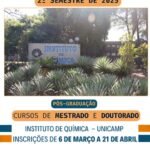From Forest to Friction: CNCs in Eco-Friendly Lubricant Formulations
Palestrante: Profa. Dra. Dana Grecov – The University of British Columbia – Canadá
Abstract: The development of a new generation of lubricants is of paramount technological and economic significance, as it is estimated that half of the worldwide energy consumption is lost to friction. To enhance the properties of the lubricants, a chemical component or blend could be added to improve their performance. Cellulose Nanocrystals (CNC), as an environmentally friendly cellulose derivative, exhibit a remarkable improvement in the coefficient of friction and wear when added to various suspensions. CNCs used in this research are derived from cellulose in wood, directly linking them to forests as a sustainable and renewable source of advanced biomaterials. This talk explores the application of CNC in two primary lubrication systems: industrial and biological. The effect of CNC addition on optimizing the lubrication performance of various suspensions will be presented. Different lubrication mechanisms were proposed to explain the observed friction and wear reduction in CNC-based lubricants. Our findings demonstrate that CNC-based industrial lubricants provide a sustainable and high-performance alternative to mineral oil-based lubricants. The addition of CNC not only enhances energy efficiency and reduces wear but also promotes a carbon-neutral solution, supporting environmental sustainability and reducing reliance on petroleum-derived products. Moreover, there is an increasing demand for advanced lubricants specifically designed for biomedical applications to ensure biocompatibility, minimize implant wear, and enhance the performance of medical devices. Our findings demonstrate that incorporating cellulose nanocrystals as additives in these lubricants can help achieve all these goals. Overall, the findings of this research contribute to the development of lubricants with optimized properties for diverse industrial and biomedical applications.





